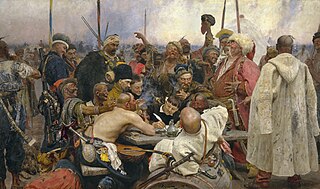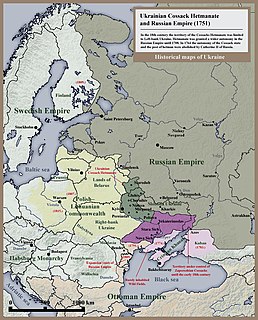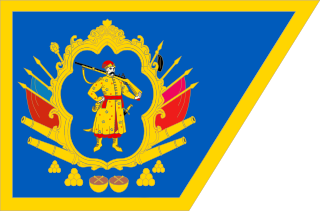
Zynoviy Bohdan Khmelnytsky was a Ukrainian Hetman of the Zaporozhian Host of the Crown of the Kingdom of Poland in the Polish–Lithuanian Commonwealth. He led an uprising against the Commonwealth and its magnates (1648–1654) that resulted in the creation of a state led by the Cossacks of Ukraine. In 1654, he concluded the Treaty of Pereyaslav with the Tsardom of Russia.

Cossacks were a group of predominantly East Slavic-speaking people who became known as members of democratic, self-governing, semi-military communities, predominantly located in Eastern and Southern Ukraine and in Southern Russia. They inhabited sparsely populated areas and islands in the lower Dnieper, Don, Terek and Ural river basins and played an important role in the historical and cultural development of both Ukraine and Russia.

Hetman is a political title from Central and Eastern Europe, historically assigned to military commanders.

The history of the Cossacks spans several centuries.

Ataman was a title of Cossack and haidamak leaders of various kinds. In the Russian Empire, the term was the official title of the supreme military commanders of the Cossack armies. The Ukrainian version of the same word is Hetman. Otaman in Ukrainian Cossack forces was a position of a lower rank.

The Zaporozhian Cossacks, Zaporozhian Cossack Army, Zaporozhian Host or simply Zaporozhians were Cossacks who lived beyond the rapids of the Dnieper River, the land also known under the historical term Wild Fields in today's Central Ukraine. Today much of its territory is flooded by the waters of Kakhovka Reservoir.

Kuban Cossacks or Kubanians, are Cossacks who live in the Kuban region of Russia. Most of the Kuban Cossacks are descendants of different major groups of Cossacks who were re-settled to the western Northern Caucasus in the late 18th century. The western part of the host was settled by the Black Sea Cossack Host who were originally the Zaporozhian Cossacks of Ukraine, from 1792. The eastern and southeastern part of the host was previously administered by the Khopyour and Kuban regiments of the Caucasus Line Cossack Host and Don Cossacks, who were re-settled from the Don from 1777.

Hetman of Zaporizhian Cossacks is a historical term that has multiple meanings.

The Zaporozhian Sich was a semi-autonomous polity and proto-state of Cossacks in the 16th to 18th centuries, centred in the region around today's Kakhovka Reservoir and spanning the lower Dnieper river in Ukraine. In different periods the area came under the sovereignty of the Polish-Lithuanian Commonwealth, the Ottoman Empire, the Tsardom of Russia, and the Russian Empire.

Ivan Vyhovsky was a hetman of the Ukrainian Cossacks during three years (1657–59) of the Russo-Polish War (1654–1667). He was the successor to the famous hetman and rebel leader Bohdan Khmelnytsky. His time as hetman was characterized by his generally pro-Polish policies, which led to his defeat by pro-Russian faction among the Cossacks.
Polkovnik is a military rank used mostly in Slavic-speaking countries which corresponds to a colonel in English-speaking states and oberst in several German-speaking and Scandinavian countries. The term originates from an ancient Slavic word for a group of soldiers and folk. However, in Cossack Hetmanate and Sloboda Ukraine, polkovnyk was an administrative rank similar to a governor. Usually this word is translated as colonel, however the transliteration is also in common usage, for the sake of the historical and social context. Polkovnik began as a commander of a distinct group of troops (polk), arranged for battle.

The Cossack Hetmanate, officially known as the Zaporizhian Host was a Ukrainian Cossack host in Central Ukraine between 1649 and 1764.

The Treaty of Hadiach was a treaty signed on 16 September 1658 in Hadiach between representatives of the Polish–Lithuanian Commonwealth and Ukrainian Cossacks. It was designed to elevate the Cossacks and Ruthenians to the position equal to that of Poland and Lithuania in the Polish–Lithuanian union and in fact transforming the Polish–Lithuanian Commonwealth into a Polish–Lithuanian–Ruthenian Commonwealth.

The Ostryanyn uprising was a 1638 Cossack uprising against the Polish–Lithuanian Commonwealth. It was sparked by an act of the Sejm (legislature) passed the same year that declared that non-Registered Cossacks were equal to ordinary peasants in their rights, and hence were subjected to enserfment. The uprising was initially led by Cossack Hetman Yakiv Ostryanyn but was eventually crushed.
Taras Fedorovych was a prominent leader of the Dnieper Cossacks, a popular Hetman elected by unregistered Cossacks.

The Kuban People's Republic was an anti-Bolshevik state during the Russian Civil War, comprising the territory of the modern-day Kuban region in Russia.

The Fedorovych uprising was a rebellion headed by Taras Fedorovych against the Polish-Lithuanian Commonwealth in 1630.

Yakym Somko, was a Ukrainian Cossack military leader of the Pereyaslav regiment and was the Acting Hetman of Left-bank Ukraine in 1660-1663, during The Ruin.

Free Cossacks were Ukrainian Cossacks that were organized as volunteer militia units in the spring of 1917 in the Ukrainian People's Republic. The Free Cossacks were precursors of the Ukrainian national law enforcement organizations such as the National Guard of Ukraine or the Internal Troops of Ukraine.

Hetman of Zaporizhian Host is a former historic government office and political institution of Cossack Hetmanate in Ukraine that was equivalent to a head of state. The office was liquidated on the edict of Russian Governing Senate of 17 November 1764.









